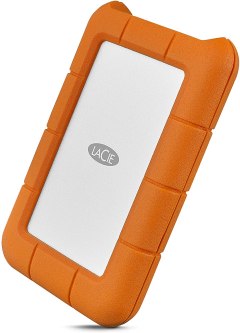
A great hard drive that will keep your info protected on the go.
A great hard drive that will keep your info protected on the go.
Has a reversible USB-C drive and a traditional USB for connection to any device you need. Is completely drop protected. Transfers file quickly.
May have to go through some formatting issues upon first run.
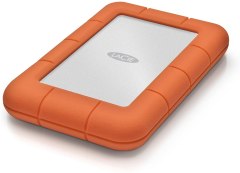
An external hard drive with a rugged build.
An external hard drive with a rugged build.
Rubber edges keep the hard drive protected from drops and scrapes. Comes with several different connection options including the fast Thunderbolt USB-C.
Hard drive suffers from slow speeds and hang-ups when using photo editing software.
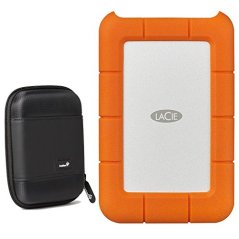
A great small option for an external hard drive.
A great small option for an external hard drive.
Weather and drop/crush resistance makes this hard drive perfect for travel or for use outdoors. Comes with a dedicated soft case.
Thunderbolt/USB-C connection does not deliver the advertised high speeds.
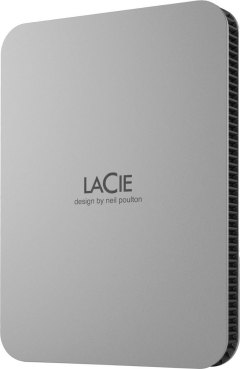
A solid drive that comes in a lot of different memory sizes.
A solid drive that comes in a lot of different memory sizes.
Comes in sizes from 1TB up to 5TB. Works for both Mac and PC devices. Has the ability to schedule automatic backups whenever you need it to. Easy to use.
Doesn't come with its own USB-3 cable.
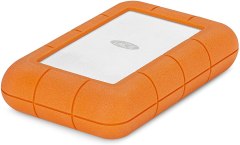
Rugged and durable yet quick to transfer when you need it.
Rugged and durable yet quick to transfer when you need it.
Can transfer files at up to 250MB/s. Drop, dust, and water-resistant. Comes with 4TB worth of memory. Has an embedded SD card reader.
Some users noted that certain files take longer than others.

We recommend these products based on an intensive research process that's designed to cut through the noise and find the top products in this space. Guided by experts, we spend hours looking into the factors that matter, to bring you these selections.

Most modern desktop and laptop computers come with adequate storage space, but eventually, most systems require some form of external memory to keep up with your growing collection of documents and media files.
The computer hardware company, LaCie — a trusted brand for over 30 years — specializes in external hard drives. LaCie offer an assortment of external hard drive products, some ultra-portable, others high capacity.
Choosing the right LaCie external hard drive for you will come down to a few different factors. We’ve put together a list of our favorites, and provided a brief overview of what to consider when shopping for a LaCie external hard drive in our handy guide.

Most external hard drives offer at least 500GBs worth of storage. This capacity is commonly found in La Cie’s portable, mobile, and rugged designs. While that’s plenty of space for a casual user’s collection of photos, videos, and documents, some users may want more space for large HD video files, games, and photos.
The majority of LaCie external hard drives can be found in the 1 to 10 Terabytes (TB) range, including their rugged, mobile, and desktop options. Most users can find a quality product that meets all of their data storage and backup needs at a relatively affordable price.
For large organizations, businesses, and enterprise data storage solutions, LaCie also offers high capacity, 8TB to 168TB RAID storage options. RAID storage is basically multiple drives combined together to create one high-speed, high-capacity unit that provides a bit more protection from lost data. Massive storage capacity tends to be much more expensive.
Standard Hard Drive (HDD): This is the oldest and most popular type of external hard drive. The major advantage of a HDD is that it’s capable of storing lots of data at a low cost. A HDD uses magnetism to store its data on a rotating platter, where a read/write head floats above the spinning platter reading and writing data. The faster the platter spins, the faster the hard drive can perform.
USB 3.0 and USB-C: Most LaCie drives are both USB 3.0 and USB-C compatible, but not all. USB-C connections tend to be speedier, and there are a few drives that are strictly USB 3.0, so be sure to check the drive specs.
Desktop: Typically larger in size and more powerful, desktop designs tend to offer more compatibility and connectivity options. When it comes to RAID systems, their large frames allow them to hold more drives for more storage.
Mobile: LaCie mobile drives are sleek, low profile, and made to fit in small spaces. They hold up to 5TB of space and come USB-C and USB 3.0 compatible. Both HDD and SSD models are available.
Rugged: Portable hard drives designed for continuous transport and travel, LaCie rugged drives are known for their thick protective shell — a casing that is water resistant, shock resistant, and drop resistant.
LaCie external drives are able to be both password protected and encrypted through Seagate Secure Technology. Users are also able to complete one-click backups and scheduled automatic backups, and to execute folder mirroring across multiple devices through the easy-to-use LaCie Toolkit software.

Inexpensive: All of the 500GB LaCie hard drives and most of the 1TB to 2TB drives can be found in the $50 to $250 price range. LaCie hard drives that are USB 3.0 only will cost a bit less than their USB-C counterparts, so it’s possible to find a larger storage solution in this price range if it’s USB 3.0 only.
Mid-level: In the $250 to $500 price range you’ll find a healthy mix of storage capacity and speed. 4TB to 8TB external drives that are USB-C compatible are generally found in this price range. High capacity SSD are also found in this price range.
Expensive: High-capacity drives with thunderbolt connectivity can be found for $500 and above. RAID systems will typically be much more expensive, costing well into the thousands.
Speed is a huge factor in quality hard drive performance. There are many steps you can take to make sure that your storage products continue working properly.
Be mindful of how many other devices are connected to the same port or hub. Multiple devices moving large amounts of data at once can play a major role in slowing down transfer speeds.
Make sure that both ends of your USB or USB-C cables are firmly connected in their respective ports. If you’re still having trouble with your connection, try disconnecting both ends, waiting 10 seconds, then reconnecting them.
If you can’t seem to get faster speeds from your external hard drive, check your system’s USB port. Older machines with USB 2.0 ports will still transfer data more slowly than newer machines, even when using high-speed LaCie drives.
We like the 2TB Lacie Fuel Wireless Storage for its unique wireless transferring feature. Its software works with all major operating systems, including iOS and Android, and it doesn’t require internet access to connect. The slim design works anywhere, and it possesses a battery life of up to 10 hours. The LaCie d2 Thunderbolt 3, 8TB USB 3.1 External Hard Drive is a slightly larger storage solution that combines 8TB of storage with standard USB and the lighting quick Thunderbolt 3 connectivity, which reaches speeds of up to 240MB/s.

Q. Do LaCie drives work with PC and Mac?
A. Yes. All LaCie drives are compatible with both PC and Mac. It’s important to format your new drive accordingly before transferring any files.
Q. What’s the fastest connection: Thunderbolt, USB-C, or USB 3.0?
A. Typically users will get the fastest connection and transfer speeds from newer Thunderbolt and USB-C connections. Other factors to consider are internet connection, file size, and any additional cable adapters or ports being used.
Q. Can I connect more than one hard drive to my computer at once?
A. Yes. Users are able to connect to as many LaCie external hard drives as their machine allows. This is determined by how many USB 3.0, USB-C, and Thunderbolt ports the machine has. Some hard drives will also allow users to string multiple drives together, creating a “daisy chain” of storage.
Get emails you’ll love.
Learn about the products you’re wondering if you should buy and get advice on using your latest purchases.
